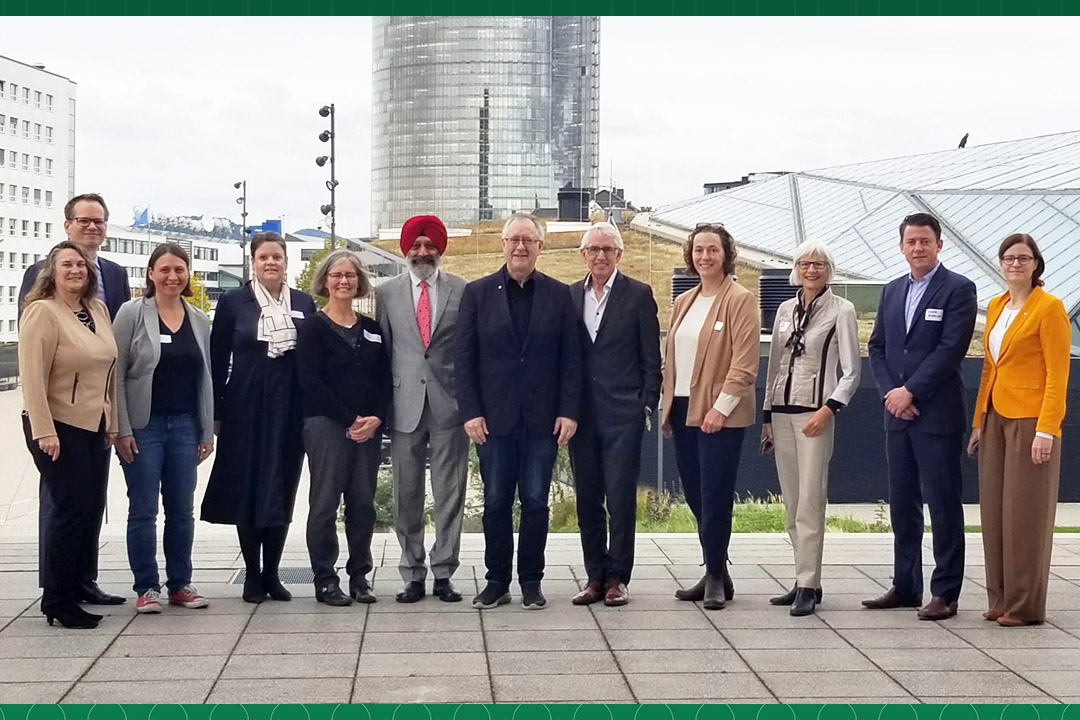
USask strengthens research partnerships with University of Bonn
A delegation from the University of Saskatchewan (USask) travelled to the University of Bonn (UBonn) in Germany as part of an ongoing commitment to develop joint research projects between the institutions.
By Matt Olson, Research Profile and ImpactMembers of USask’s senior leadership team took part in a “research summit” during a recent trip to Frankfurt, Bonn and Berlin, with the goal of fostering and reaffirming USask’s commitment to Germany in both research and education.
The summit also emphasized the connection between USask, UBonn and the Government of Saskatchewan’s international ties to Germany, while also identifying shared areas of research expertise on which to collaborate.
UBonn Rector Professor Michael Hoch expressed in a statement satisfaction with the summit and the potential it promised for future research.
“Our partnership with the University of Saskatchewan is greatly important to us as a substantial element within our international network,” Hoch said. “At this third meeting held between us this year, we initiated highly concrete steps that we will be taking in our collaborative research efforts. Within this framework our researchers will be jointly addressing topics of global impact, and I could not be more pleased at this very positive and dynamic development."
As part of the summit, members of the USask delegation participated in targeted research roundtables with counterparts from the UBonn to delve further into possible research partnerships and strategies for the future. The theme of the research summit and the roundtables that took place was titled “Planetary health: facing future challenges” – a theme which aligns strongly with USask’s research priorities.
Dr. Markus Brinkmann (PhD), the director of the Toxicology Centre and USask’s Special Advisor to the Vice-President Research on Strategic Research Partnerships with Germany, said the summit was beneficial for the top-quality researchers from both Canada and Germany.
“Being able to sit at a table, brainstorm, stick your heads together and freely chat is really rewarding. You can build important personal relationships … It’s easier to do that in person,” Brinkmann said.
Brinkmann pointed to a series of core “excellence clusters” laid out by the University of Bonn – focused research topics similar to USask’s Signature Areas of research – as key places where the two institutions could overlap and share knowledge. He said the UBonn’s focus in areas like water science and security, agriculture, Indigenous engagement, and more overlap well with USask’s research strengths.
Not only will the combined research strengths of two international institutions create more opportunities for groundbreaking research, Brinkmann said it will also generate more avenues to find support and funding as researchers target topics with worldwide implications.
“Those topic areas, they are all globally important. Think about sustainability, water security – those are intricately linked with climate change. Think about food security, sustainable food production – our food systems are global and interconnected. Think about vaccines and therapeutics – COVID-19 was one of those examples where you could see how easily a public health issue in one part of the globe can affect all of the planet,” he said. “Solutions to any and all of those problems need to be global, as well.”
UBonn Vice-Rector of International Affairs Professor Birgit Ulrike Münch was also excited to have concrete plans in place for future connections between the UBonn and USask.
“These steps include jointly taught classes, networking events and colloquia via Zoom, and specific projects within the framework of German-Canadian grant programs,” Münch said in a statement from UBonn. “In August the rector and I attended a meeting of the German U15 with our Canadian counterpart alliance in Ottawa, representing the first bilateral meeting of its kind as an effort to permanently increase German-Canadian partnership across the board, as set out in an official joint statement by the two countries. These latest developments in our relationship with our partners in Saskatchewan, and the timing thereof, are thus most favorable and welcome.”
The USask delegation included:
- Peter Stoicheff (PhD), president
- Grit McCreath, chancellor
- Kathryn Warden, special advisor
- Baljit Singh (PhD), vice-president Research
- Markus Brinkmann (PhD), director, Toxicology Centre
- Maureen Reed (PhD), professor, School of Environment and Sustainability
- Volker Gerdts (DVM, PhD), director and CEO, Vaccine and Infectious Disease Organization (VIDO)*
- Steven Rayan (PhD), director, Centre for Quantum Topology and Its Applications*
- Corinne Schuster-Wallace (PhD), executive director, Global Institute for Water Security
- Robert Henry (PhD), scientific director, nātawihowin & mamawiikikayaahk Research, Training and Mentorship Networks (SK-NEIHR)
- Meghna Ramaswamy (PhD), director, International Office
- Dr Angela Bedard-Haughn (PhD), dean, College of Agriculture and Bioresources
*not included in photo
Together, we will undertake the research the world needs. We invite you to join by supporting critical research at USask.
Article re-posted on .
View original article.

